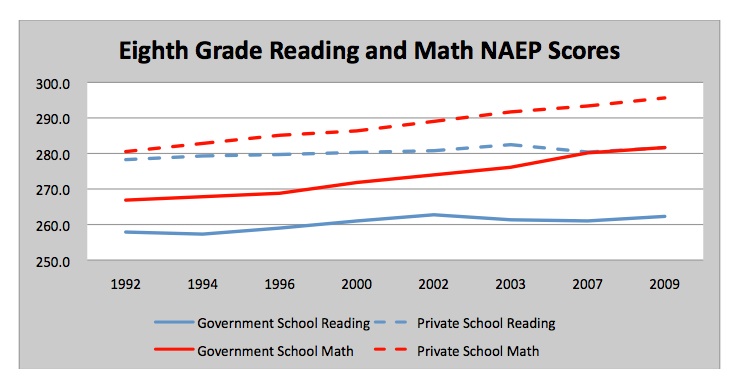Solution of the week: School choice
Editor’s note: Earlier this year, NPRI released Solutions 2013, a comprehensive sourcebook of research and recommendations in 39 policy areas. Now, each week during the run-up to the 2013 Legislative Session, NPRI is highlighting one of these as its Solution of the Week. If you would like NPRI to speak to your organization about this or another policy recommendation, please contact Victor Joecks at vj@npri.org. Solutions 2013 is also available online here.
In virtually every aspect of life, Nevadans demand choice. They expect a choice of grocers, retailers, food service providers, health care specialists and automobile manufacturers. Choice begets accountability, because producers of these goods quickly learn that, to attract and retain customers, they must offer a product consumers are willing to pay for.
Yet, in the realm of education — arguably the most significant area of an individual’s life — Nevadans have been deprived of choice. Instead, they have been forced into a state‐run monopoly. The outcome has been predictable: As the monopoly has protected poor educators from the accountability that choice imposes on grocers and retailers, the quality of Nevada’s K‐12 education system has continuously deteriorated. If Nevada’s public school system is to prepare the next generation of Nevadans to compete in a global economy and, hopefully, lead the way into a new era of successful entrepreneurship, then greater accountability is required.
The best means of achieving that is through choice. It is important to remember that public schools are not necessarily synonymous with a government monopoly on schools. Just as Albertson’s and Food 4 Less serve the public as privately owned grocers, so, too, can private schools play an important role in providing for the public’s education needs by expanding the realm of school choice.
Key Points
Private schools cost less. Nevada’s largest school districts currently spend between $11,000 and $14,000 per pupil when all expenditures are considered. On the other hand, 84 percent of private schools nationwide charge tuition rates of less than $10,000.
Private schools yield better results. Nationwide, students in private schools score almost two grade levels higher on standardized math and reading tests than do their government‐school peers. Also, graduation rates and the likelihood of attending college are far higher among private‐school students.
Every child can learn. It’s not just the wealthy elite who perform well in private schools. Low‐income beneficiaries of school choice programs in Milwaukee, Florida, Washington, D.C. and elsewhere have shown significant improvement after participating in choice programs for only a few years.
Choice improves government schools. Despite opponents’ claims that choice programs “cream” the best students away from government‐run schools, empirical evidence shows that the presence of alternatives leads to higher test scores and graduation rates for those who choose to remain in a government school.
Recommendations
Create a Public Education Tax Credit. Allow businesses facing a tax liability in Nevada — such as the Modified Business Tax, sales tax or gaming tax — to receive a dollar‐for‐dollar tax credit for donations into a scholarship fund that would finance the educational dreams of Nevada’s children. NPRI has already designed such a plan, which can be found on its website.
Establish a “Recovery School District.” Taxpayers should not be forced to subsidize failure factories. If a government school cannot meet the educational needs of Nevada families, then it should close and have its staff reorganized and, potentially, be converted into a charter school. Lawmakers can model this change after Louisiana’s Recovery School District — a special statewide school district that helps failing schools transition into successful charter schools.
Expand the universe of charter schools. Charter schools are an important component of school choice. State laws governing charter schools should grant as much flexibility as possible to administrators and allow for open entry of online charter schools.
Geoffrey Lawrence is deputy policy director at the Nevada Policy Research Institute. For more visit http://npri.org.
Read more:

